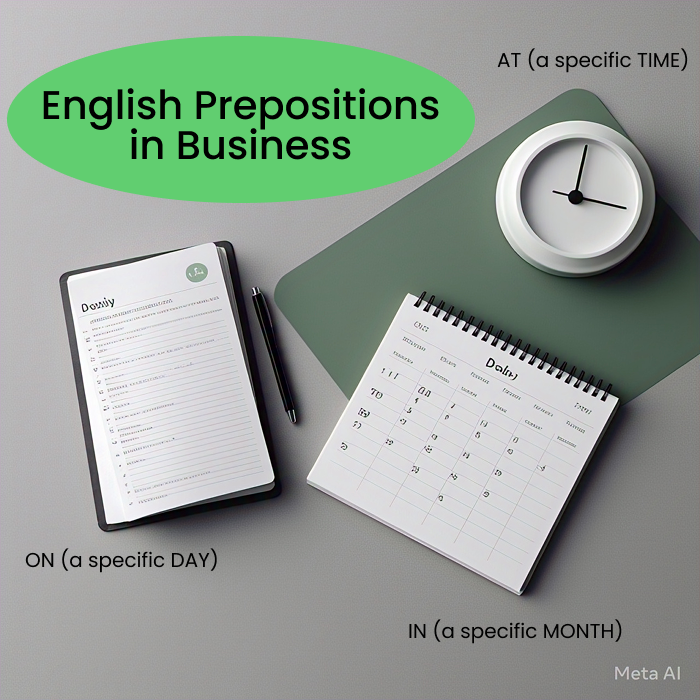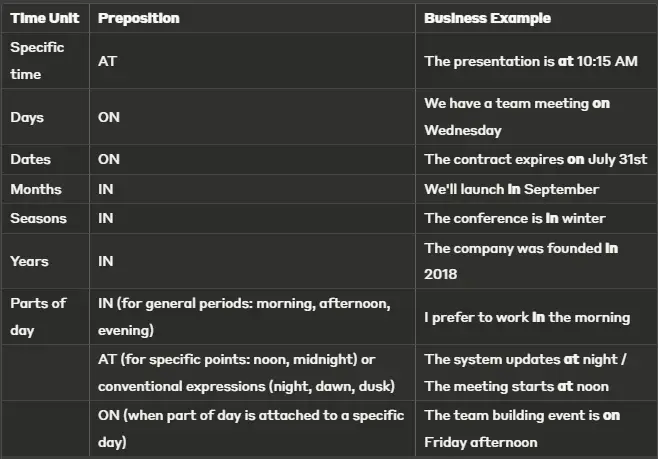English Prepositions in Business:
Why We Say On Monday, At 3:00, and In June

Have you ever wondered why English speakers say “on Monday,” “at 3:00,” and “in June”? These small words — Business English prepositions — cause big confusion for professionals learning English. Getting these prepositions wrong can make even the most qualified business person sound unsure in international settings. At BasicEnglish.online, our Native US CELTA Certified English Teacher specializes in making these tricky grammar points clear and practical through our Online English Course.
The Time Preposition Framework
In our Online English Course, we teach that Business English prepositions follow this simple framework:
- AT = specific points (precise moments)
- ON = days and dates (specific but longer than moments)
- IN = longer periods (months, seasons, years)
This isn’t just a random set of rules to memorize — there’s logic behind it! Let’s explore why these patterns exist and how to master them with help from our Native US CELTA Certified English Teachers at BasicEnglish.online.
AT: Precise Moments
We use “at” for exact moments in time — think of it as pointing to a specific spot on the clock.
Common Business English prepositions examples:
- “The meeting starts at 2:30 PM”
- “Please call the client at noon”
- “The conference call is scheduled at the top of the hour”
♦ Pro Tip from BasicEnglish.online:
“At” is also used with “night” (“at” night”) and special time points like “at midnight,” “at dawn,” and “at the moment.” Our Online English Course includes many such practical tips for business professionals.
ON: Days and Dates
We use “on” for specific days and dates — think of it as circling a day on your calendar.
Common examples from our Business English prepositions lessons:
- “Let’s schedule our meeting on Monday”
- “The project deadline is on June 15th”
- “The quarterly report is due on the first day of each quarter”
♦ Pro Tip from our Native US CELTA Certified English Teacher:
We also use “on” with specific day parts that feel like distinct units: “on Monday morning,” “on Tuesday afternoon.”
IN: Longer Periods
We use “in” for longer time periods — think of it as being inside a container of time.
Common Business English prepositions examples:
- “We’ll release the new product in October”
- “Our fiscal year ends in 2025″
- “Profits typically increase in the summer”
- “We should see results in a few weeks”
♦Pro Tip from BasicEnglish.online:
“In” is also used with time periods from now: “in an hour,” “in three days,” “in two months.” These distinctions are clearly explained in our Online English Course.
Business Email Examples
Incorrect:
❌ “I’ll send the proposal in Monday.”
❌ “The meeting is scheduled on 3:00 PM.”
❌ “We expect to close the deal at March.”
Correct:
✓ “I’ll send the proposal on Monday.”
✓ “The meeting is scheduled at 3:00 PM.”
✓ “We expect to close the deal in March.”
Special Cases in Business Settings
Conference Calls and Virtual Meetings
“In a meeting” = actively participating in an ongoing meeting “At a meeting” = present at a specific meeting event “On a call” = participating in a phone/video conversation
Example: “I’ll be in meetings all day, but I can connect on a call at 5:30 PM.”
Project Timelines
“In time” = before a deadline without specification “On time” = exactly at the scheduled time “At the same time” = simultaneously
Example: “Please submit your reports on time so we can review them in time for the board meeting. Multiple teams may be working on this at the same time.”
Quick Reference Chart for Business Schedules

Our Online English Course at BasicEnglish.online provides comprehensive reference materials like this to support your learning.
Why Do These Rules Matter in Business?
When scheduling international meetings or setting project deadlines, using the wrong preposition can cause confusion or misunderstandings. Small language errors can:
- Create uncertainty about exact meeting times
- Cause missed deadlines due to misunderstood timeframes
- Reduce your perceived professionalism in international business settings
Using Business English prepositions correctly demonstrates your attention to detail and clear communication skills — both highly valued in business contexts. This is why our Native US CELTA Certified English Teachers at BasicEnglish.online emphasizes these practical grammar points.
Practice Exercise
Fill in the blanks, in these sentences with the correct prepositions:
- “We’re launching the new website _____ June 15th _____ 9:00 AM.”
- “The fiscal year begins _____ January and ends _____ December.”
- “I’m available for a meeting _____ Thursday morning, but I have calls scheduled _____ the afternoon.”
- “The quarterly report is due _____ the beginning _____ each quarter.”
- “Please submit expense reports _____ the end of the month.”
(Hover here for the Answers)
At BasicEnglish.online, our AI-enhanced Online English Course with our Native US CELTA Certified English Teacher combines the best of both worlds – human expertise and technological innovation.

